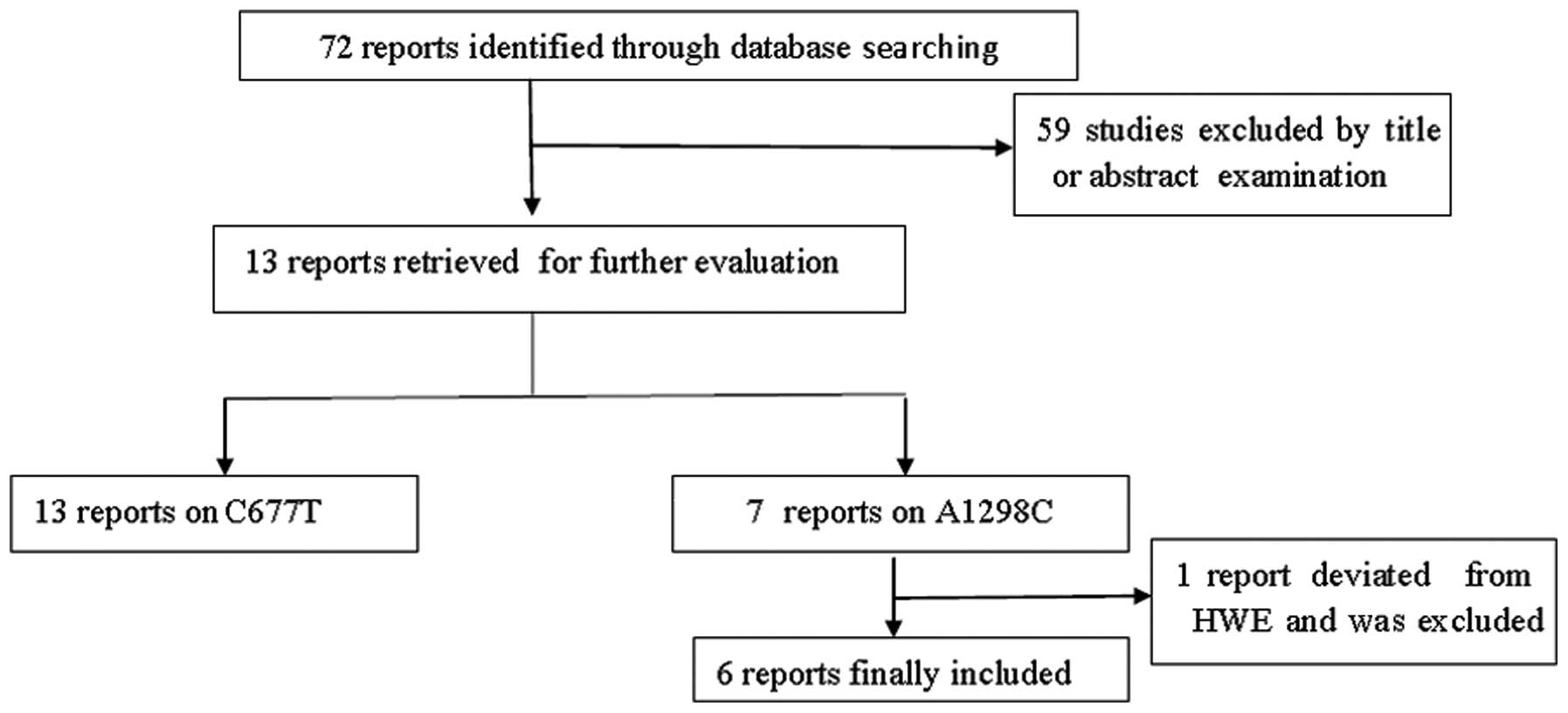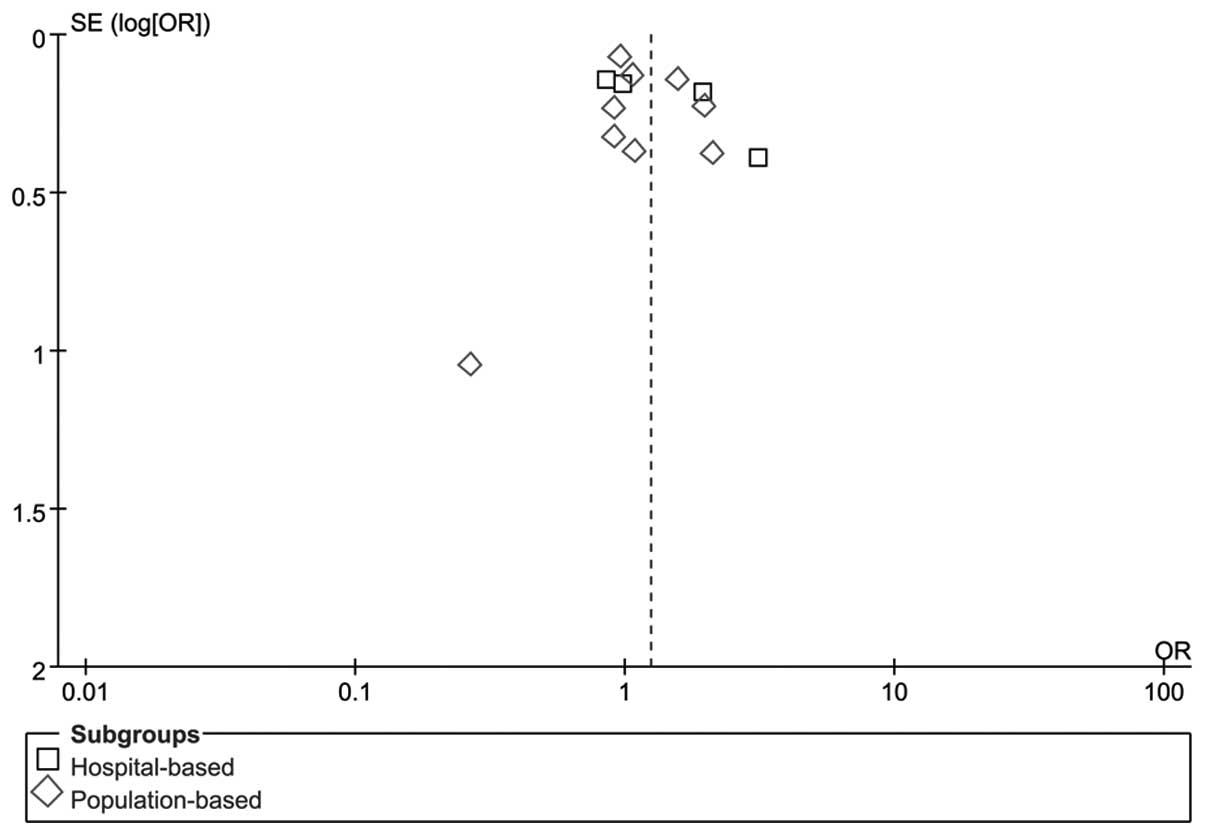|
1
|
Jemal A, Siegel R, Ward E, Hao Y, Xu J and
Thun M: Cancer statistics. CA Cancer J Clin. 59:225–249. 2009.
|
|
2
|
Schwartz AG: Lung cancer: family history
matters. Chest. 130:936–937. 2006.PubMed/NCBI
|
|
3
|
van der Put NM, Gabreels F, Stevens EM, et
al: A second common mutation in the methylenetetrahydrofolate
reductase gene: an additional risk factor for neural-tube defects?
Am J Hum Genet. 62:1044–1051. 1998.PubMed/NCBI
|
|
4
|
Mao RF, Fan Y, Jin Y, Bai J and Fu S:
Methylenetetrahydrofolate reductase gene polymorphisms and lung
cancer: a meta-analysis. J Hum Genet. 53:340–348. 2008. View Article : Google Scholar : PubMed/NCBI
|
|
5
|
Curtin K, Bigler J, Slattery ML, Caan B,
Potter JD and Ulrich CM: MTHFR C677T and A1298C polymorphisms:
diet, estrogen, and risk of colon cancer. Cancer Epidemiol
Biomarkers Prev. 13:281–292. 2004.PubMed/NCBI
|
|
6
|
Guo SW and Thompson EA: Performing the
exact test of Hardy-Weinberg proportion for multiple alleles.
Biometrics. 48:361–372. 1992. View
Article : Google Scholar : PubMed/NCBI
|
|
7
|
Woolf B: On estimating the relation
between blood group and disease. Ann Hum Genet. 19:251–253. 1995.
View Article : Google Scholar
|
|
8
|
Zintzaras E and Ioannidis JP:
Heterogeneity testing in meta-analysis of genome searches. Genet
Epidemiol. 28:123–137. 2005. View Article : Google Scholar : PubMed/NCBI
|
|
9
|
Higgins JP and Thompson SG: Quantifying
heterogeneity in a meta-analysis. Stat Med. 21:1539–1558. 2002.
View Article : Google Scholar : PubMed/NCBI
|
|
10
|
Egger M, Davey Smith G, Schneider M and
Minder C: Bias in meta-analysis detected by a simple, graphical
test. BMJ. 315:629–634. 1997. View Article : Google Scholar : PubMed/NCBI
|
|
11
|
Ma QL, Li YF, Ji M, Yang KY, Wang JY, Li S
and Huang YC: The relationship of Methylenetetrahydrofolate
reductase SNP677C_T and lung cancer susceptibility. Chin J
Clinicians (Electronic Edition). 6:213–215. 2012.(In Chinese).
|
|
12
|
Kiyohara C, Horiuchi T, Takayama K and
Nakanishi Y: Methylenetetrahydrofolate reductase polymorphisms and
interaction with smoking and alcohol consumption in lung cancer
risk: a case-control study in a Japanese population. BMC Cancer.
11:4592011. View Article : Google Scholar
|
|
13
|
Cui LH, Yu Z, Zhang TT, Shin MH, Kim HN
and Choi JS: Influence of polymorphisms in MTHFR 677 C→T, TYMS
3R→2R and MTR 2756 A→G on NSCLC risk and response to platinum-based
chemotherapy in advanced NSCLC. Pharmacogenomics. 12:797–808.
2011.
|
|
14
|
Cheng Z, Wang W, Song YN, et al:
Investigation of the relationship between C677T polymorphisms of
methylenetetrahydrofolate reductase and lung cancer risk. Chin J
Tuberc Respir Dis. 34:57–58. 2011.(In Chinese).
|
|
15
|
Cui LH, Shin MH, Kim HN, et al:
Methylenetetrahydrofolate reductase C677T polymorphism in patients
with lung cancer in a Korean population. BMC Med Genet. 12:282011.
View Article : Google Scholar : PubMed/NCBI
|
|
16
|
Yang XX, Li FX, Yi J, Li X, Sun JZ and Hu
NY: An association of methylenetetrahydrofolate reductase reductase
C677T and gastric cancer, colorectal cancer and lung cancer
susceptibility. Guangdong Med J. 31:2375–2377. 2010.(In
Chinese).
|
|
17
|
Liu CS, Tsai CW, Hsia TC, et al:
Interaction of methylentetrahydrofolate reductase genotype and
smoking habit in Taiwanese lung cancer patients. Cancer Genomics
Proteomics. 6:325–329. 2009.PubMed/NCBI
|
|
18
|
Liu H, Jin G, Wang H, et al: Association
of polymorphisms in one-carbon metabolizing genes and lung cancer
risk: a case-control study in Chinese population. Lung Cancer.
61:21–29. 2008. View Article : Google Scholar : PubMed/NCBI
|
|
19
|
Suzuki T, Matsuo K, Hiraki A, et al:
Impact of one-carbon metabolism-related gene polymorphisms on risk
of lung cancer in Japan: a casecontrol study. Carcinogenesis.
28:1718–1725. 2007. View Article : Google Scholar : PubMed/NCBI
|
|
20
|
Jin C, Zhang YH, Peng MF, Li WD, Ma L and
Chen WS: Study of the relationship between C677T, A1298C gene
polymorphisms of methylenetetrahydrofolate reductase and lung
cancer. Chin Clin Oncol. 12:671–675. 2007.
|
|
21
|
Zhang XM, Miao XP, Tan W, Qu SN, Sun T,
Zhou YF and Lin DX: Association between genetic polymorphisms in
methylentetrahydrofolate reductase and risk of lung cancer. Acta
Academiae Medicinae Sinicae. 27:700–703. 2005.(In Chinese).
|
|
22
|
Shen M, Rothman N, Berndt SI, et al:
Polymorphisms in folate metabolic genes and lung cancer risk in
Xuan Wei, China. Lung Cancer. 49:299–309. 2005. View Article : Google Scholar : PubMed/NCBI
|
|
23
|
Jeng YL, Wu MH, Huang HB, et al: The
methylenetetrahydrofolate reductase 677C→T polymorphism and lung
cancer risk in a Chinese population. Anticancer Res. 23:5149–5152.
2003.
|
|
24
|
Hosseini M, Houshmand M and Ebrahimi A:
MTHFR polymorphisms and breast cancer risk. Arch Med Sci.
7:134–137. 2011. View Article : Google Scholar : PubMed/NCBI
|
|
25
|
Hubner RA and Houlston RS: MTHFR C677T and
colorectal cancer risk: a meta-analysis of 25 populations. Int J
Cancer. 120:1027–1035. 2007. View Article : Google Scholar : PubMed/NCBI
|
|
26
|
Zintzaras E: Association of
methylenetetrahydrofolate reductase (MTHFR) polymorphisms with
genetic susceptibility to gastric cancer: a meta-analysis. J Hum
Genet. 51:618–624. 2006. View Article : Google Scholar
|
|
27
|
Issa JP: DNA methylation as a therapeutic
target in cancer. Clin Cancer Res. 13:1634–1637. 2007. View Article : Google Scholar : PubMed/NCBI
|
|
28
|
Kim YI: Folate and carcinogenesis:
evidence, mechanisms, and implications. J Nutr Biochem. 10:66–88.
1999. View Article : Google Scholar : PubMed/NCBI
|
|
29
|
Weisberg IS, Jacques PF, Selhub J, et al:
The 1298A→C polymorphism in methylenetetrahydrofolate reductase
(MTHFR): in vitro expression and association with homocysteine.
Atherosclerosis. 156:409–415. 2001.
|
|
30
|
Stern LL, Mason JB, Selhub J and Choi SW:
Genomic DNA hypomethylation, a characteristic of most cancers, is
present in peripheral leukocytes of individuals who are homozygous
for the C677T polymorphism in the methylenetetrahydrofolate
reductase gene. Cancer Epidemiol Biomarkers Prev. 9:849–853.
2000.
|
|
31
|
Arslan S, Karadayi S, Yildirim M, Ozdemir
O and Akkurt I: The association between methylene-tetrahydrofolate
reductase gene polymorphism and lung cancer risk. Mol Biol Rep.
38:991–996. 2011. View Article : Google Scholar : PubMed/NCBI
|
|
32
|
Hung R, Hashibe M, McKay J, et al:
Folate-related genes and the risk of tobacco-related cancers in
Central Europe. Carcinogenesis. 28:1334–1340. 2007. View Article : Google Scholar : PubMed/NCBI
|
|
33
|
Shi Q, Zhang Z, Li G, Pillow PC, Hernandez
LM, Spitz MR and Wei Q: Sex differences in risk of lung cancer
associated with methylene-tetrahydrofolate reductase polymorphisms.
Cancer Epidemiol Biomarkers Prev. 14:1477–1484. 2005. View Article : Google Scholar : PubMed/NCBI
|
|
34
|
Siemianowicz K, Gminski J, Garczorz W,
Slabiak N, Goss M, Machalski M and Magiera-Molendowska H:
Methylenetetrahydrofolate reductase gene C677T and A1298C
polymorphisms in patients with small cell and non-small cell lung
cancer. Oncol Rep. 10:1341–1344. 2003.PubMed/NCBI
|
|
35
|
Heijmans BT, Boer JM, Suchiman HE, et al:
A common variant of the methylenetetrahydrofolate reductase gene
(1p36) is associated with an increased risk of cancer. Cancer Res.
63:1249–1253. 2003.PubMed/NCBI
|
|
36
|
Shen H, Spitz MR, Wang LE, Hong WK and Wei
Q: Polymorphisms of methylene-tetrahydrofolate reductase and risk
of lung cancer: a case-control study. Cancer Epidemiol Biomarkers
Prev. 10:397–401. 2001.PubMed/NCBI
|
|
37
|
Higgins JPT and Green S: Cochrane Handbook
for Systematic Reviews of Interventions Version 510 (updated March
2011). The Cochrane Collaboration. 2011, Available at https://handbook-5-1.cochrane.org.
|
|
38
|
Golledge J and Norman PE: Relationship
between two sequence variations in the gene for peroxisome
proliferator-activated receptor-gamma and plasma homocysteine
concentration. Health in men study. Hum Genet. 123:35–40. 2008.
View Article : Google Scholar
|
|
39
|
Sazci A, Ergul E, Tuncer N, Akpinar G and
Kara I: Methylenetetrahydrofolate reductase gene polymorphisms are
associated with ischemic and hemorrhagic stroke: Dual effect of
MTHFR polymorphisms C677T and A1298C. Brain Res Bull. 71:45–50.
2006. View Article : Google Scholar : PubMed/NCBI
|

















